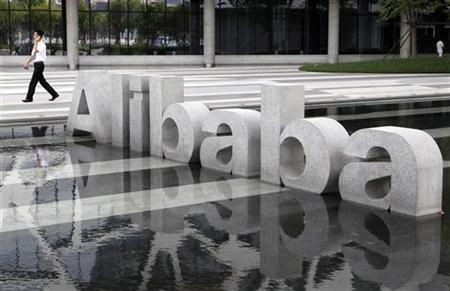
(Reuters) – E-commerce giant Alibaba’s Singles’ Day sales broke through the $8 billion mark late on Tuesday, illustrating the buying power of the Chinese consumer and the importance of the event in the retail calendar.
The live sales figure on Alibaba Group Holding Ltd’s (BABA.N) giant screen at its sprawling Hangzhou campus surged past 2013’s record high to the 50 billion yuan ($8.16 billion) mark with almost three hours left on the clock as Chinese and overseas shoppers bought heavily discounted online goods.
The recent U.S. listing, just eight weeks ago, seemed though to quieten company leaders.
Jack Ma, the normally chatty executive chairman, shied away from the main media events, limiting himself to an interview with state broadcaster China Central Television (CCTV).
The shopping day, similar to Cyber Monday and Black Friday in the U.S., comes less than eight weeks after its public share listing in New York, which set its own $25 billion record.
Alibaba turned the Singles’ Day celebration, a Nov. 11 Chinese response to romantic holidays like Valentine’s Day, into an online shopping festival in 2009. It copyrighted the “Double 11” term three years later after recognizing its commercial potential.
“You’re seeing the unleashing of the consumption power of the Chinese consumer,” Joe Tsai, Alibaba Group’s executive vice chairman, told reporters.
“We really are witnessing history here because we are seeing the shift of the economy from focused on the state sector to consumption.”
Alibaba did 35 billion yuan in business during last year’s festival, and Tech research firm IDC predicts this year’s total gross merchandise volume (GMV) will reach $8.62 billion.
BOOSTING THE NUMBERS
Less than 18 minutes into this year’s “11.11 Shopping Festival”, GMV had already hit $1 billion.
The numbers are boosted by Alibaba’s “pre-sales initiative”. Merchants advertised Singles’ Day prices as early as Oct. 15, taking deposits for the items but only processing full payments and shipping the goods on Singles’ Day itself.
Though the 27,000 vendors that take part can boost their sales and gain customers by being featured on Alibaba’s Singles’ Day shopping sites, some have complained that discounts and cut-throat corporate rivalry undercut the benefits.
Analysts also said Alibaba’s GMV will be driven by order cancellations during Singles’ Day being delayed until Wednesday on Tmall.com, its online retail site.
“Tmall will not let you cancel Singles’ Day orders until the following day, because they want to be able to talk about the GMV number and the enormous target,” said Mark Natkin, managing director of Beijing-based Marbridge Consulting.
POLE POSITION
While rivals such as JD.com Inc (JD.O), Suning Commerce Group Co Ltd 002024.SZ andWal-Mart Stores Inc’s (WMT.N) Yihaodian have all gotten in on the Singles’ Day act, Tsai was bullish about Alibaba’s pole position.
“I don’t think any other company in China can create a day like this,” he said.
Chinese online retailer JD.com said on its official Twitter account that orders in the first 16 hours of Singles’ Day had more than doubled compared with last year.
China’s Xiaomi Technology Co Ltd [XTC.UL], the world’s third-largest smartphone maker, which also uses the Singles’ Day festival to boost turnover, said on its official Weibo account its sales had so far surpassed 1.4 billion yuan, and as of Tuesday evening it had sold more than 1 million handsets.
The “11.11 Shopping Festival”, which Alibaba says is the world’s biggest 24-hour online sale, began with just 27 merchants in 2009 offering deep discounts on the company’s Tmall site to boost sales during an otherwise slack period.
This year’s festival is global, reaching shoppers in more than 200 countries, the company said.







